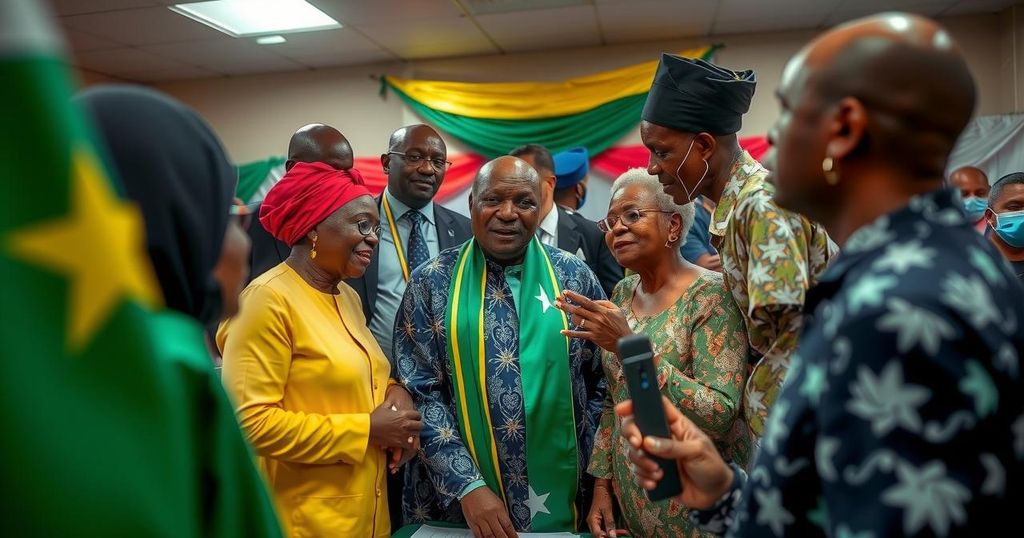Senegal’s Ruling Party Secures Legislative Victory Amid Controversy
Senegal’s ruling party, PASTEF, has declared victory in the recent legislative elections, which is expected to support President Bassirou Diomaye Faye’s reform agenda. Opposition parties have conceded defeat despite allegations of fraud from former President Macky Sall. The new administration faces significant economic challenges, including high unemployment and a large budget deficit, adding pressure to their governance.
The ruling party in Senegal, PASTEF, has declared a decisive victory in the legislative elections held recently, with near-final ballot counts supporting their claim. This victory follows President Bassirou Diomaye Faye’s earlier success in the presidential elections, thereby facilitating his ambitious reform plans. Local sources indicate that PASTEF’s early polling results positioned them favorably, prompting government spokesman Amadou Moustapha Ndieck Sarre to credit the Senegalese populace for their support. Despite ongoing vote counting, both main opposition parties quickly conceded to PASTEF. Opposition leader Barthelemy Dias openly acknowledged the election results, congratulating PASTEF on their achievement. However, former President Macky Sall alleged that the election process was compromised by significant fraud purportedly orchestrated by PASTEF, although he did not clarify these claims further. The newly elected President Faye, at 44 years old, had expressed a commitment to enacting change during his inauguration in April. His prior challenges in implementing his vision stemmed from holding a minority of seats in parliament. His administration faced hurdles, particularly concerning reforms on corruption and resource allocations, which were impeded by an opposition-controlled legislature. Faye’s prior presidential election victory—a 54% first-round majority—had bolstered expectations for enhanced parliamentary representation for PASTEF during these elections, likely aiding their recent success. Sall, who has maintained a position in opposition from abroad, faced criticism for escalating protests leading up to the elections, driven by his attempts to postpone the presidential elections. Former Prime Minister Amadou Ba also led his coalition against PASTEF, with increasing tensions marked by occasional violence among supporters during the campaign. The opposition has criticized the new government for perceived inaction and alleged obsession with retaliating against former officials. Presently, Senegal grapples with significant unemployment rates exceeding 20%, with many individuals attempting perilous journeys to Europe for better opportunities. The new administration’s efforts to alleviate the cost of living have included price reductions on essential goods, impacting public finances amid an acknowledged budget deficit larger than previously disclosed. In response to these financial challenges, international financial entities, including the International Monetary Fund, have suspended aid amid ongoing assessments, which have prompted risks to Senegal’s credit ratings, echoing broader economic concerns. Through all these developments, the political landscape remains dynamic as the new government navigates both economic difficulties and the complexities of governance.
The recent legislative elections in Senegal represent a crucial development within the country’s political framework, particularly following President Bassirou Diomaye Faye’s earlier election. The ruling party, PASTEF, aims to implement a reform agenda following a mandate from the electorate. However, the political dynamic is further complicated by opposition allegations of electoral fraud and significant socioeconomic challenges facing the nation. These factors contribute to discussions about governance practice, the role of opposition in democracy, and the necessity for responsive policymaking to address unemployment and economic deficits.
The legislative elections in Senegal have resulted in a clear victory for the ruling PASTEF party, enabling President Faye to pursue his intended reforms. Opposition parties have conceded, although allegations of fraud linger, presenting ongoing challenges for political stability. As economic conditions remain pressing, with high unemployment and budget deficits, the new government faces the formidable task of addressing these issues while fostering democratic governance and national unity.
Original Source: www.dw.com




Post Comment